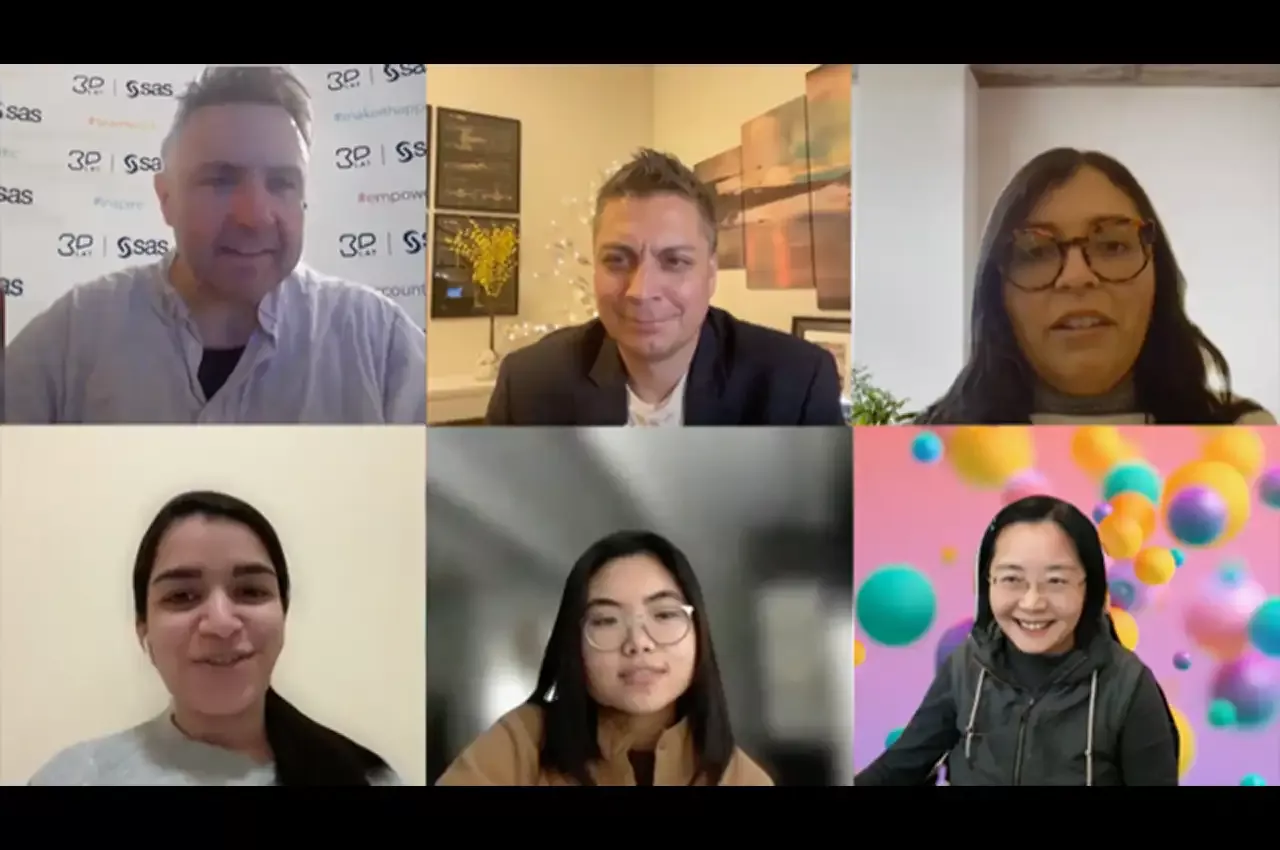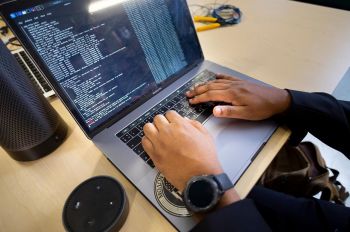Three Illinois Tech Students Qualify for International Hackathon Championship

Three Illinois Institute of Technology students formed a research team to develop an investment optimization tool, which has qualified them for the international SAS Hackathon 2023 Grand Champion.
Narges Hosseinzadeh (M.S. AMAT ’23), Kan Zhang (Ph.D. AMAT ’23), and Thi Truong (AMAT ’23) were joined by Olivia Martin, a data science student at Northwestern University, and Vasilios Farmak, a software and data engineer from Greece, to form StaSAStician. Using the open-source SAS Viya environment, the team developed a dashboard that allows insurance advisers to optimize an investment portfolio based on risk and environmental, social, and corporate governance (ESG) standards. The dashboard visualizes these variables for clients, allowing the clients to see how these variables affect the potential returns on their investments.
The work resulted in taking the top spot in the Insurance Division of the 2023 SAS Hackathon, qualifying the team for the overall top prize, which will be announced at SAS Explore convention to be held in Las Vegas in September. The team also secured second place in the Student and Young Talent awards.
“I consider the SAS Hackathon a great opportunity to showcase skills and knowledge in data analytics, programming, and problem-solving,” Zhang says. “It promotes collaboration and networking as we can form a team to exchange ideas. Additionally, we can get hands-on experience on real-world challenges and datasets, enabling us to apply our skills to solve practical problems.”
Team members say ESG investing is an important element to the dashboard because it integrates sustainability and ethical considerations into investment decisions. It allows investors to align their financial goals with their values, promoting positive social and environmental impact while potentially mitigating long-term risks. ESG factors can provide insights into a company’s resilience, innovation, and ethical practices, enhancing the assessment of investment opportunities. By supporting companies that prioritize sustainability, responsible governance, and social responsibility, ESG investing can contribute to a more sustainable and equitable future.
Extracting ESG grades for companies proved to be a challenge, as team members say ESG data is often scattered, unstructured, and not standardized, requiring extensive data collection and analysis. They also say there are no consistent rules for measurement and no regulation to mandate the way insurers and other industries report their contribution to ESG data. In addition, there is a lack of transparency and reporting standards among companies, leading to incomplete or unreliable data, assessments involve subjective judgments and are not uniformly defined, and there are several gaps found in the consistent reporting framework between the companies that participate in the sustainability program.
However, the biggest challenge the team faced was time. The team was given one month to become familiar with the SAS Viya platform, ESG investing, to develop a product, and produce pitch videos.
“When it comes to strict deadlines such as hackathons, creative things and a unique way of thinking arises,” Farmak says. “Simple ideas don’t need too much time.”
The team was assembled under the guidance of Sou-Cheng Terrya Choi, research associate professor of applied mathematics at Illinois Tech. She had worked on previous research projects with Hosseinzadeh, Zhang, and Martin. Truong joined after he approached Choi to inquire about research opportunities. The team recruited Farak for his knowledge of SAS through the competition’s online forum.
Choi says competitions like the SAS Hackathon provide students with a unique opportunity to apply classroom knowledge and research skills to tackle complex, emerging real-world problems. The process also requires knowledge sharing, critical thinking, innovative solutions, and teamwork.
“With SAS being renowned for its statistical software and global presence, participating in the SAS Hackathon would enable these students to delve into SAS’s latest cloud platform, SAS Viya,” she says. “This immersive experience in big data analysis and machine learning would not only enhance their analytical skill set but also open numerous doors of opportunity for their future endeavors.”
Choi says she saw a lot of growth in valuable professional skills throughout the competition.
“It was a joy for me to witness the team’s passion for learning, collaboration, problem-solving, and personal development throughout the one-month event,” she says. “Despite their lack of prior hackathon experience, they transformed from novices to champions, earning two esteemed awards in the competition.”
Team members say the success found through the hackathon is just the beginning for StaSAStician, as they would like to add features, explore ESG grading and investing, or maybe even take the dashboard to market.
“Our team’s collaboration and compatibility were amazing. Working together on the ESG project has inspired me to continue partnering with this group and explore other project opportunities,” Hosseinzadeh says.




